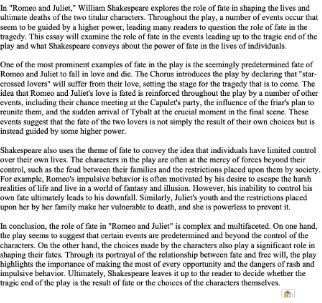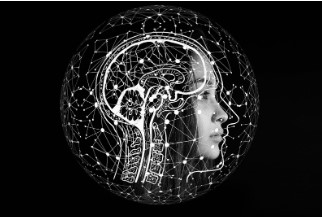Chat GPT and More: Examining the Impact of AI Language Models on Education
With AI continuing to advance and infiltrate our society, many have concerns about the impacts on education.

Chat GPT Paragraph
February 10, 2023
Artificial Intelligence (AI) can be defined as a branch of computer science in which smart machines are designed to perform tasks that traditionally require human intelligence, according to the website TechTarget, a marketing company. These AI systems work by processing large amounts of information, typically presented through language, and analyzing that information for any correlations or patterns. The systems use this information to predict future conditions. Advancements in this branch are creating a shift in essentially every sector of the tech industry, and education is no exception.
From the website Bernard Marr & Co, a think tank organization, AI is progressively being integrated into the educational sector to make learning more accessible, personalized, and functional. AI powered tutors give students direct feedback on their work and can be used as a tool for learning. AI technology can also pose benefits for educators such as automatically grading assignments, quizzes, and even essays. The use of tools like this can free up time for educators to dedicate to planning class time activities, preparing lessons, or providing individualized help for a student.
Dr. Christina Fisanick is a professor of English here at PennWest California. When asked about her interest in the use of AI systems to grade essays, she responded, “Even with heavy workloads, I don’t believe that I would get to know my students that way. How would I get to know their writing? How would I know their strengths and weaknesses? If you are going to surrender your grading, why not allow the AI to teach the whole class?” As AI technology continues to advance, there are growing concerns among educators about the possible impact of AI-generated papers and loss of academic integrity.
ChatGPT (Generative Pre-trained Transformer), is a chatbot that was launched by OpenAI in November of 2022. This system uses adaptive human-like text to answer questions, write stories, and engage in dialogue. It even has the ability to debug computer code, admit its mistakes, challenge incorrect premises, and reject inappropriate requests. With such an advanced piece of technology available for free use, it is no surprise that students are using these applications to complete homework, quizzes, and even essays. Since ChatGPT was made public, various organizations have put in place policies against submitting AI generated work.
When conducting research on this topic, it was only fair to ask ChatGPT what it thought of the impact of itself, and whether or not it believed that it posed a problem for higher education. It responded, “As a language model AI, I do not have personal opinions, but AI poses both challenges and opportunities for higher education. On the one hand, AI has the potential to make education more personalized and accessible to students, helping them learn at their own pace. On the other hand, AI-generated papers and other forms of AI technology in education raise concerns about the impact on students’ originality, creativity, and critical thinking skills. AI in education is a complex issue that requires careful consideration and balancing of the potential benefits and challenges. Educators and institutions must take steps to ensure that AI technology is used in a way that supports the quality of education and the development of students’ critical thinking and writing skills.”
The AI has admittedly had issues with bias, and this poses another issue for anyone using this system for research. This is due to the fact that all of the information that the computer has in its database was created originally by a human, which has historically presented racism, sexism, and many other biases. The danger of this is the possibility of misinformation being spread. Dr. Fisanick says, “From my perspective, it is capturing a moment in time and reflecting back to us who we are. On the one hand, it is dehumanizing us, but I think it is also reflecting both the best and worst of humanity.”
ChatGPT is still currently available for free use, and it can be found at OpenAI’s website. Included with this article is an example of a sample essay written by ChatGPT, to view as an example of its work. The AI was asked to write a college freshman level essay about the role of fate in William Shakespeare’s Romeo and Juliet.
“The one thing that we have to consider when talking about concerns is that it is another way of devaluing the humanities, and the work that we do. Many of the companies that are using this technology are using it to try and cut employees, specifically entry level copywriters. If you can ask the AI to write a 250-word blog post about the fashion trends for 2023, it will scour the web and its own databases, and it will create a fairly reliable bit of information. But you will always need human beings for finesse, tone, and style. Learning how to be a good communicator is a priceless skill,” said Dr. Fisanick. “I don’t fear it, the way that maybe some other writers do, or maybe I should. I do feel like once the sort of dust settles on this, we will be able to have more conversations. I think that people will learn to work with it, rather than against it.”

As AI continues to evolve, it is important that we address the concerns about its impact on academic integrity and problem solving/critical thinking. By doing so, we can ensure that AI is used to support, rather than undermine, the goals of education.





